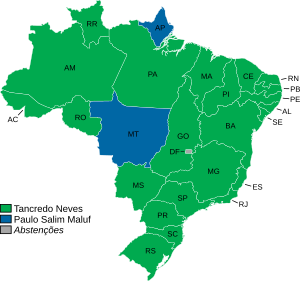| |||||||||||||||||||
686 members of the electoral college 344 electoral votes needed to win | |||||||||||||||||||
|---|---|---|---|---|---|---|---|---|---|---|---|---|---|---|---|---|---|---|---|
| |||||||||||||||||||
 | |||||||||||||||||||
| |||||||||||||||||||
| This article is part of a series on the |
 |
|---|
Presidential elections were held in Brazil on 15 January 1985, the last to be held indirectly through an electoral college, and the last to be held under the military regime. The electoral college system was put in place so that the military elite that controlled the government could secure the election of the candidate chosen by the High Command of the Armed Forces as president. However, in 1985, due to the process of negotiated transition to democracy that started in the late 1970s, the politicians in the electoral college were placed under no coercion, and were allowed to choose the president of their choice.
Although Tancredo Neves of the Brazilian Democratic Movement Party was elected president, he became seriously ill one day before his inauguration and subsequently died, resulting in his running mate José Sarney becoming president.

